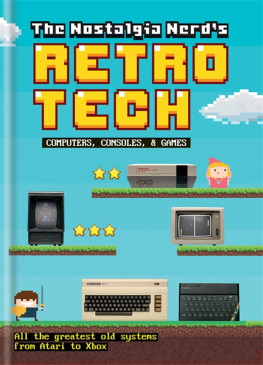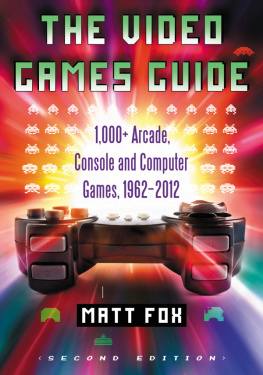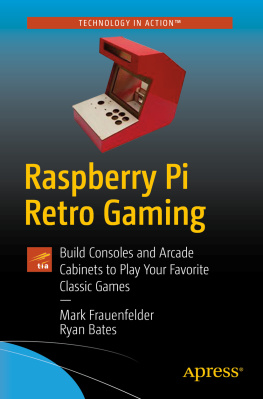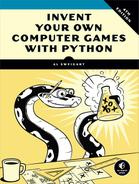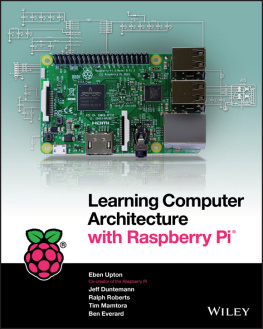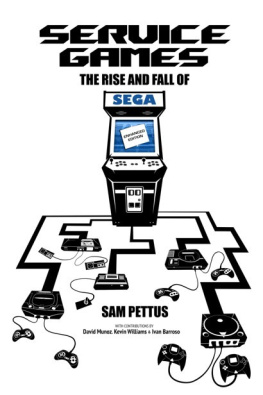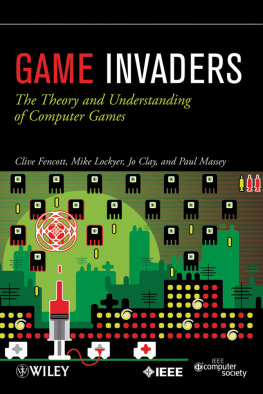
Contents
How to use this ebook
Select one of the chapters from the and you will be taken straight to that chapter.
Look out for linked text (which is blue) throughout the ebook that you can select to help you navigate between related sections.
You can double tap images and tables to increase their size. To return to the original view, just tap the cross in the top left-hand corner of the screen.
Foreword

Hello there. My name is Peter Leigh. You may know me better as Nostalgia Nerd. I spend a great deal of my time documenting and discussing vintage computers and consoles, and they are something I am deeply passionate about. Where did this passion stem from? Well, I imagine like many of you reading this book, I grew up in the early days of microcomputers. I witnessed this new technology appearing year-in, year-out, and it was fascinating.
Its hard for me to recall a specific memory that triggered my passionmainly because there are so manybut I remember the day I first witnessed a computer at school. It was a BBC Micro, and as Mrs. Aldis wheeled it into the classroom on a red trolley, my mind was running with curiosity and excitement. What was I looking at here? It looked like a television, but then as Mrs. Aldis pressed a key something changed on-screen. You couldnt do this with television. You couldnt change the fate of characters on-screen with the power of just your fingers. Like that I was hooked.
This wasnt the only experience that drew me in. My father worked as a computer programmer, back in the days when the computers took up an entire floor of an office building and used massive tape reels, just like it was ripped directly from a sci-fi movie. His interest meant that my brother, David, and I were introduced to computers at an early age. We stared incredulously at the screen while my mum pandered to our needs. Living in the UK, the choice of this computer was of course, a . That little black box with the flash of rainbow in the corner was captivating enough, but being able to type in programs from the Dorling Kindersley Spectrum User Guide and create colorful sunsets and explosions on-screen was something else entirely.
These experiences set me on a path of seeking out the next and best technology I (my parents) could afford. It must have been around 1986 when I first cast my eyes on a ZX Spectrum. By the early 1990s I had moved on to a , and then on to the ultimate possession, an IBM Compatible PC (based around a 486DX2/50 processor no less). Each of these electronic experiences seems pretty fleeting now, but back then they lasted for what seemed like an eternity. Its strange how time works, because now it seems to rocket past me at a blistering rate, whereas waiting a month for a new game release felt like ages in the 1980s and 1990s.

I remember playing the Atari ST with my good friend Michael, where wed quest through Gauntlet II for an entire afternoon, taking on the full persona of an elf or a fantasy derived wizard. When wed had enough of that, wed find ourselves strolling down the streets of Double Dragon, from the comfort of the living-room floor. Memories like that hold the same magic now as they did at the time.
But it didnt take long before I wanted to understand more. Of course I wanted bigger and better games, but I was more interested in the inner-workings of these games. From that initial moment back in the mid-1980s, I was curious as to how they all worked. How exactly did pressing a joystick fire button result in Red Wizard shooting the food? How did typing Hello into a speech-synthesis program translate to actual audible words within less than a second? I really wanted to know.
Its for this reason that I became involved in understanding the hardware, software, and programming as early as I could. Its something I pursued into my adulthood. From there I realized that this passion discovered in youth would never die, and I wanted to share this knowledge, this excitement, and this enthusiasm with as many people as I could. After all, these early days only happen once, and everyone should understand where weve come from and how it has led to the technology were blessed with today. From that perspective you can gain a better understanding of how things work, and you can understand how the struggles of these pioneering companies led to a future where everything is a bit more uniform and a bit more civilized (whether or not you consider that a good or bad thing).

So whats in the book?
Because games were what lured me into this digital universe in the first place, it makes sense to talk about them. I could easily sit here and write about all the games for a given platform, or even just focus on one particular game and write about that. But I love so many games and so many systems that it doesnt feel right. My favorite subject to talk about is the history of these games and the machines that ran them. I discuss the most significant gaming consoles and home computers, from where it all started in the early 1970s up to the current line of gaming platforms. I tell you a little bit about the history of each machine and how they helped progress gaming. Ill also provide three titles for each machine that I think you Must See, Must Play, and Must Avoid.
The Must See games are titles that really pushed the system. The games that squeezed the hardware dry and in the process dazzled our senses. If you want to see what a system is capable of, look these titles up.
The Must Play games represent the title I believe you should play if you ever get the opportunity.
However, if you have a chance to play one of these systems and the game youre given is from the Must Avoid list, then politely turn the offer down and move along.
Now, of course, these choices are subjective and tough to call, and this is especially true of the worst games. I for one know that I loved playing some games in my youth that are regarded as utterly terrible by most. So Ive given you my opinion and hope you agree, or at least understand my reasoning. This is the only way I could keep the book to a reasonable length, while providing you with a comprehensive picture of this glorious past.
I can only hope you enjoy reading it as much as I did writing it.

Computers, Consoles, and Games


MAGNAVOX
ODYSSEY

Although computers had been on the scene for a number of years, it wasnt until Magnavox released their Odyssey in 1972 that the technology was specifically aimed toward gaming in the home. Created by Ralph Baer, Bill Harrison, and Bill Rusch, the machine (originally known as the Brown Box) impressed Magnavoxs VP of Marketing, Gerry Martin, enough to turn the prototype into a consumer device. Often early consoles like the Odyssey are referred to as analog machines, but really the innards are simply made up of custom discrete logic circuits, rather than based around a core microprocessor. This basic makeup meant the Odyssey was designed with no sound ability and could only display one vertical line, along with three square dots shown in white against a black background.
Next page
